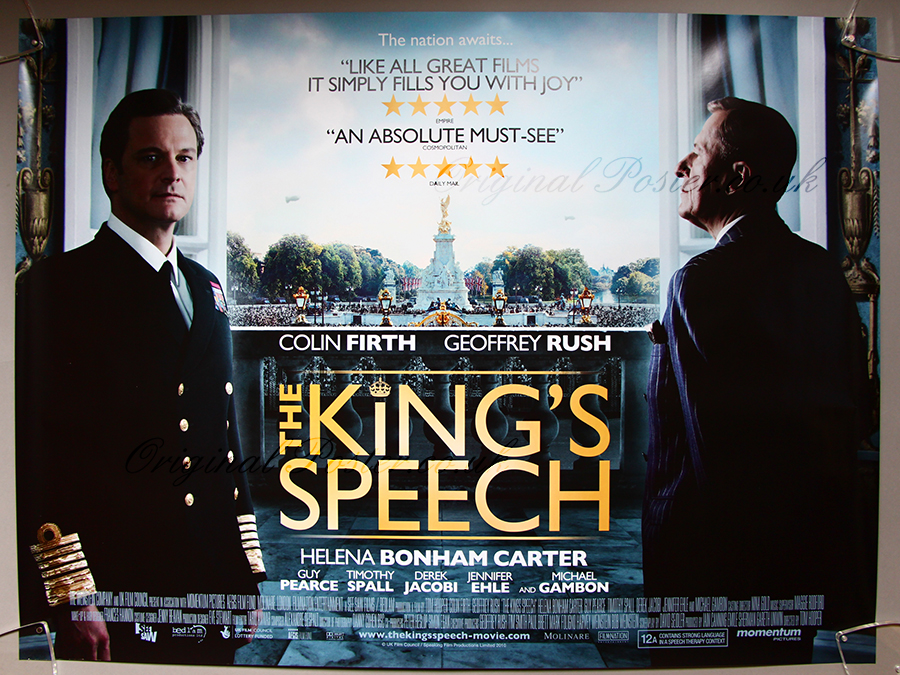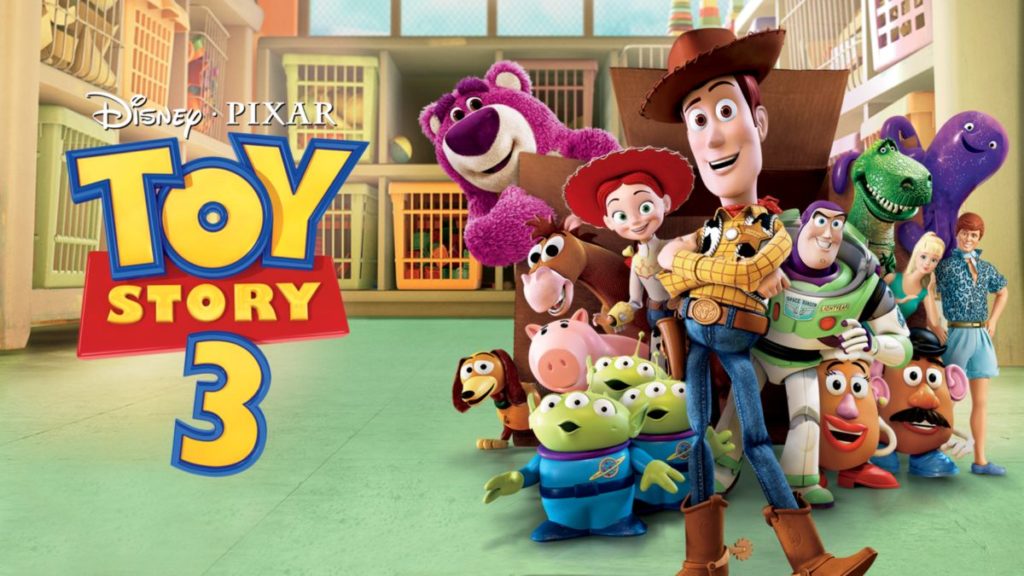2010
So. Let’s kick off the final decade by finally describing, in precise detail, what makes for Good Successful Oscar Bait… by digging into the movie that did nearly all of it.
Albert, Duke of York (Colin Firth), who has struggled with a stutter since age five, seeks out a speech therapist after a disastrous public appearance. After royal-approved doctors prescribe nonsense such as mouthfuls of marbles or cigarettes (which almost certainly killed him in the end), his wife (Helena Bonham-Carter) finds an unusual option in Australian practitioner Lionel Logue (Geoffrey Rush), who insists that to treat Albert, the two men must speak as equals. This becomes rather more high-stakes when Albert’s father, the King (Michael Gambon), passes away and older brother, David (always love me some Guy Pearce), abdicates the throne of England to marry an American divorcee Nazi sympathizer. The two men form an unorthodox friendship as Lionel tries to get Bertie, now King George VI, ready to deliver the speech that inspires his kingdom to beat the Nazis–okay…
First of all let’s deal with the bullshit factor of this particular biopic before we get into the Oscar Bait of it all. 1) The film starts in the mid-20s, then implies Bertie and Lionel meet then but don’t actually work together until the mid-30s, when David takes the throne (but clearly won’t be keeping it). This is false, Lionel had Bertie able to deliver a speech by 1927, although they did keep working together. But no, there’s a more dramatic timeframe, and we have to set it all then. 2) Guy Pearce plays the older brother, but he’s seven years younger than Firth and it shows. 3) Late in the movie, Prime Minister Baldwin resigns due to underestimating the threat of Hitler, handing the country over to Neville Chamberlain as the Empire prepares for war, that’s wrong, fair or not the one thing Neville Chamberlain is famous for is saying “Look just give Hitler a bit of Czechoslovakia and he’ll stop there.” 4) The movie spans a whole decade but princesses Elizabeth and Margaret sure don’t age.
So why all these big changes to the story? Could the simple story of a royal making friends with a commoner to defeat an all-too-human impediment not have enough drama? Well, given current views on the royals, probably not, but even putting that aside, it’s not Oscar Worthy Drama. No, the makers loaded as much Academy catnip into this movie as they could. Such as…
- Biopics. However distorted the narrative and timeline is, King George VI, Lionel Logue, and their friendship were all quite real. They probably never had a falling out because Lionel said Bertie would be a better king than David but maybe they did, I wasn’t there.
- Class disparity. Upper class King George and lower-class Lionel discover that deep down we’re all the same. Basically.
- Overcoming a disability. Oh they used to love this one, especially because it was great fodder for actors looking for an Oscar (what up, My Left Foot, Theory of Everything, A Beautiful Mind?). And given how many Academy members are actors, yeah, that tends to get them on the shortlist.
- White saviour stories. This one’s a stretch, he doesn’t help any minorities realize they should have civil rights, dang it, but they do very much overexaggerate how important a leader King George VI was.
- The Weinsteins are involved. Feel like I’ve covered this one. The Weinsteins loved them some Oscar prestige, and Harvey is a monster who Hollywood enabled way, way too long. But here’s the big one…
- Fighting Hitler. Holocaust topics are the purer Oscar baits, but anything World War 2 related has a decent chance. And so a friendship from the mid 20s gets moved to the mid-30s so that the looming threat of Hitler can come into play. Hitler, who Bertie notes is a great speaker while Bertie still has his stammer. And so his big speech, his titular King’s speech, is the Thing That Will Rally the Empire Against Hitler, and BOO. Speech therapy has never had such high stakes, but for a reason.
The cast is solid, sure, but the direction is very weird. In a movie about two men forming an unlikely friendship, the camerawork seems engineered to stress isolation and disrepair. Tom Hooper tried to fit as much exposed plaster as he could into shots as though that added something. Patrick Willems can explain better than I can, but it’s the start of Tom Hooper’s signature trait as a director: directorial choices that not only don’t suit but actively undermine the scene he’s filming. But they gave him an Oscar and let him do musicals, and… well… we know how that ultimately went.
I was gonna embed a video from Cats, but… no.
Anyway there are elements of a worthwhile story in here, but it’s so drowned in attempts to be Important (why is Churchill even here, what is he adding) that I can’t see it as anything but a calculated effort engineered to get Oscar nominations and… little else. I am hard pressed to think of a movie I’ve seen with some “win the war” moment that seems lower-stakes than “the king gives a radio address,” and yes I have absolutely seen Operation: Dumbo Drop.
And Rotten Tomatoes Says: 28th!? Over The Bridge on the River Kwai? What the damn Hell. I had briefly, mercifully, forgotten just how much recency bias was going to come into play this decade.
Where did I rank it? Out of 89 Best Picture nominees from 2010-2019 (based on year of the ceremony, so… actually released between 2009 and 2018), I ranked The King’s Speech 74th, for the reasons described above. “It’s little remembered, save for a few increasingly obscure references in the seventh season of The Office.“
Now… a big theme of the 2010s begins. There was a time, in the 80s and 90s, when “the final chapter” was a trick horror movies were trying out to lure people in for one more go-round with Freddy or Jason. In the 2010s? Final outings, “endgames,” if you will, were a big deal. Even if they rarely, if ever, actually were the “final outing.” Heroes die, recognizable IPs live forever. But let’s get to our first “Final outing.”
The Box Office Champ
Man but Toy Story 3 was a flex. Digging into the one moment implied but only touched on by Toy Story 2… what happens to these sentient toys who need interaction the way we need food when their owner grows up and gets tired of them? Remember your childhood toys? Where did they end up when you hit puberty? Now imagine they’re alive and never stopped loving you. Dark. Dark thought.
Toy Story 2 ended with Woody the cowboy deciding he’d rather be loved by a child for however long that lasts than be appreciated inside of a display case at a toy museum. Toy Story 3 picks up a few years later, when “however long that lasts” has long passed, and the toys rarely leave their toy chest. Misunderstandings occur, the toys end up a daycare that seems like paradise with a steady stream of kids to play with them, but is instead a toy gulag run by the jaded Lotso Huggin’ Bear and his cronies. There’s betrayals and schemes and an elaborate prison break sequence and a very, very tense and emotional sequence at the city dump…
But what’s really, really notable here is the central theme, and how well it’s expressed, and how bold it was that Pixar put it in a kids’ film.
The central theme, they key message, is that loss is inevitable. You will lose people. Even the people who mean the very most to you may someday leave your life, no matter how hard you fight against it.
All you can control is how you react. You can treasure what time you had, adapt, and move forward, like Woody, Buzz, and the gang do when Woody manages to get them donated to a new girl with a love for toys. Or you can let it turn you cold and cruel, like Lotso does, taking revenge on the world for your pain.
Bold move to make a kids’ movie about that, bolder still to make their best movie to that point about it. The action is fun, Lotso’s the series’ best villain, there’s a glorious hero moment for the least likely toys, Spanish Mode Buzz Lightyear and Michael Keaton as Ken are both incredibly fun, the incinerator scene and final sequence with Andy and the toys are incredibly emotional and still got to me, Toy Story 3 is wonderful.
Just one note, really.
When Woody first ends up with young Bonnie, finding that maybe a new future with a new kid is possible (and preferable to ending up in the attic until Andy’s midlife crisis), the other toys talk about “classical training” and how Woody just “jumps on in,” and, and… and are the toys supposed to be active participants in playtime, or are they inert whenever kids are nearby? That is an element of the mythology I don’t get. But whatever, it’s fine, don’t worry about it, just roll with it.
I also felt that perhaps Buzz had a reduced role this time out, and that it was more Woody-centric with Buzz becoming part of the toy ensemble rather than co-lead. Perhaps because in 2010 Tom Hanks was growing into an icon of all that’s good and pure in humanity and Tim Allen was going hard-conservative and bitching about PC culture and maybe one of those people gets pushed a little out of the spotlight.
Anyway it’s a perfect final chapter for these sentient toys and then nine years later Toy Story 4 happened and, well… look watch this if you want to dig into that.
And Rotten Tomatoes Says: 98% from critics and 90% from audiences, 4% higher and a surprising 2% lower than The King Speech respectively. Guess The King’s Speech is a bit of a crowd-pleaser.
Where did I rank it? In year two of trying to boost the ratings from their 2008 historic lowpoint by slipping some hits into the expanded Best Picture category (which worked a little for about a decade, until 2018 and 2020 each set new low-ratings records), Toy Story 3 got a proper Best Picture nomination as well as Best Animated Feature. So like precious few other Box Office Champs this decade, it’s on my nominee ranking list. Pretty high, too! It’s fifth, in between two movies you might not know but really should see, Hell or High Water (#4) and Winter’s Bone (#6). “Tense, moving, Pixar at its best.”
Other Events in Film
- This Year in Superheroes: Iron Man 2 takes some flak for spending too much time setting up the MCU and not enough telling a good story or having interesting villains (leading to waste of some perfectly good Sam Rockwell); Jonah Hex takes DC’s classic cowboy anti-hero and, well, ruins him.
- The Golden Globes’ nominees for Best Comedy/Musical include action movie Red, critically panned and more boring action movie The Tourist, and Burlesque, described as “Too bad to enjoy on its own merits, not bad enough to be Showgirls.” Ricky Gervais suggests they bought their way into the nominations, while hosting the Globes, but come on he has a point. Not the worst year for “Do the Globes know what comedy is,” but close.
- I used to have a big argument about what the actual best picture of 2010 was, that being King’s Speech’s chief rival, but for all The Social Network’s strengths, one thing that’s aging worse than sympathetic portrayals of the Royal Family is sympathetic portrayals of Mark Zuckerberg.
- Tangled marks Disney Animation’s new era of CG features, a Rapunzel adaption that ended up a double act between the long-haired princess (Mandy Moore) and rogue Flynn Rider (human treasure Zachary Levi). It’s not the biggest hit of the new era (oh we’ll get to that), but it does set a new house style. For good or ill, Disney Animation became and remains CG-based, and all their movies largely resemble Tangled in appearance.
- Having gotten some accolades directing Gone Girl, Ben Affleck risks giving himself the lead role in his follow-up, The Town, and it’s great, man, The Town was legit good, there are some classic moments that live rent-free in my head to this day.
- Sure it has issues, many surrounding its protagonist, I don’t care, I unabashedly love Scott Pilgrim Vs. The World, Edgar Wright did some stunning every-frame-a-painting work filming this, the whole cast is a riot, I love it. It seems to be everything geeks would want in a movie, but it gets trounced at the box office by Eat, Pray, Love and the goddamn Expendables. It’s a cult hit now, but a bit of a flop then.
- Universal tries making an old-school monster movie in The Wolfman, with practical makeup effects and all the things film geeks say they want. It fails. Between this and Scott Pilgrim, Universal says “Fine, nerds, nuts to all of you” and doubles down on Minions and Fast/Furious.
- I don’t think The A-Team got enough love, it’s dumb but fun dumb, argue with me if you want but you won’t convince me.
- I also love Inception, but it does kinda support the criticism that Christopher Nolan is better at Ideas than Emotions.
- It was hard to explain to anyone who wasn’t a kid when Tron came out why I was excited for Tron: Legacy. Hasn’t gotten easier.
- Winter’s Bone got Oscar nominations for Best Picture and Best Actress for its largely unknown star, Jennifer Lawrence. Not enough people saw it but it got enough studio attention Lawrence snagged leads in two major franchises. Successful ones.
- Martin Scorsese collaborates with his new best pal Leonardo DiCaprio again in Shutter Island, which I should probably watch despite it having been spoiled already.
- Can any “Say the film’s name and mug to the camera” moment ever, ever top Hot Tub Time Machine? Check mate, Suicide Squad.
- Grindhouse had fake trailers in between the two main movies. One of those trailers was for Danny Trejo in Machete, which Robert Rodriguez made into a real movie this year, and I think it was more successful than Grindhouse?
- Sam Worthington moves from unprecedented hit Avatar to a remake of Clash of the Titans and it gets a sequel but admit it, you’d forgotten he was in it, if you remember that it happened at all.
- Speaking of remakes, the remake of A Nightmare On Elm Street has an even better cast than the remake of Friday the 13th, but also fails to launch a new series.
- The Coens remake True Grit, and a young Hailee Steinfeld manages to steal the movie from Jeff Bridges and Matt Damon, and they were not phoning it in.
- Ridley Scott and Russell Crowe try to recapture that Gladiator magic with a Robin Hood movie that’s actually 100% origin story and 0% fighting the Sheriff of Nottingham with the Merry Men, and it does not work.
- Legion is a movie about warring angels that’s the bane of anyone trying to see if the excellent TV show Legion (no relation) is streaming or on demand.
- Kevin Smith attempts to move from writing/directing his own stuff to just directing-for-hire with Cop Out. It doesn’t go well. Partially because we were past the point in Bruce Willis’ career where he, you know, tries. At all. It did result in an all-time-great “No” gif, though, thanks to this moment.
Next Page: Ends of Eras


